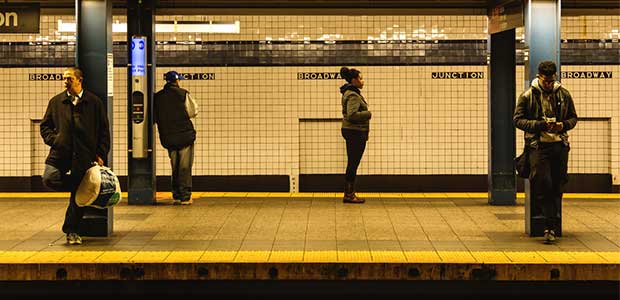
NYU’s Research on Transit Workers Will Give COVID-19 Health Insights
New York University’s School of Global Health to study the physical and mental health impact of COVID-19 on transit workers.
NYU School of Global Health and the Transport Workers Union (TWU) Local 100 decided to conduct joint research on the physical and mental health of transit workers in New York City during the coronavirus pandemic. The union represents some 40,000 New York City bus and subway workers.
New York City’s mass transit system is the largest in the United States with 7.6 million weekday riders on its subways and buses before COVID-19, according to an NYU article. While movement on the subway and bus systems have slowed during the pandemic, the Metropolitan Transportation Authority (MTA) has largely continued service on subways and buses throughout the pandemic to ensure that doctors, nurses, grocery store workers, delivery workers, first responders and other essential workers can continue to get to work.
Transit workers are at a higher risk of infection from COVID-19, however, and helping run the city for essential workers is stressful. Thousands of New York City transit workers have been infected and more than 90 TWU Local 100 members have died. Transit workers are in frequent contact with the public and are often working in enclosed areas with others. Additionally, many safety measures for transit workers and riders were not put in place until late March or April when the virus was already widespread in New York.
Research on the health and wellbeing of NYC transit workers aims to better understand the hazards they face on the job. “Our research aims to identify and better understand the individual and workplace factors that put this essential workforce at risk for COVID-19, in an effort to protect their health and wellbeing,” said Robyn Gershon, clinical professor of epidemiology at NYU School of Global Public Health, who will lead the research project. “We need to address this important gap in our knowledge about occupational exposure to coronavirus, and use these findings to determine what additional protective measures are needed going forward.”
Researchers hope that this study will help future efforts to better protect transit workers and riders during public health crises. The COVID-19 pandemic has highlighted issues in many systems and workplaces that were not previously obvious, and transit workers are arguably just as essential as the workers they transport.
The first part of the research project is a pilot study, consisting of virtual focus groups, interviews and an anonymous survey of transit workers. The survey will be conducted this month with roughly 200 workers.
The study will also help researchers evaluate the effectiveness of the MTA’s protection measures—such as using masks, additional cleaning and disinfecting, employee health screenings and social distancing. The study will also look at workers’ preexisting health conditions, age, race and ethnicity as how those might be affecting their mental health.
Using their expertise and results from the study, the researchers will develop a “Best Practice Guidelines and Recommendations” document in conjunction with TWU Local 100 union officials and the MTA; the document is expected to be completed in the fall.
“Ensuring the health of transit workers is especially important as governments and businesses move forward with reopening,” added Gershon. “A healthy transit workforce is critical to the city’s economic recovery and sustainability.”